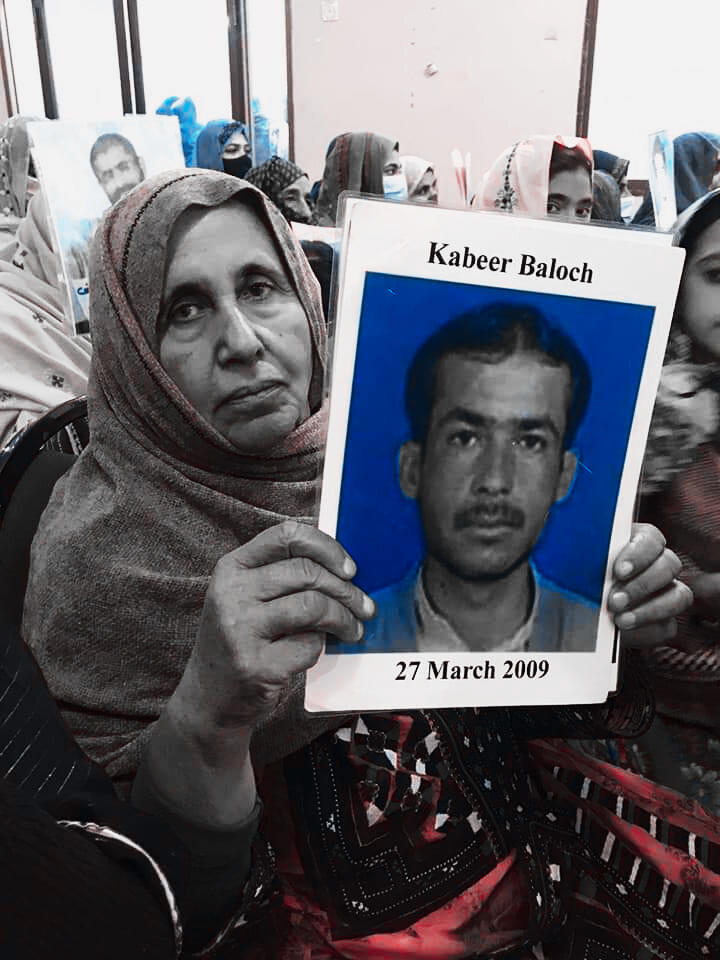‘Gumshudah’: For Kabir’s family, the wait is endless

- Date
 Xari Jalil
Xari Jalil
LAHORE
Abdul Kabir’s fingerprint on his government-issued CNIC has faded a little. After all, it was issued so long ago, that its expiry date passed in October 2018. At the bottom of the card are written instructions to carry out if the card went missing.
But the card is at home, with Kabir’s family. It is Kabir who has gone missing.
Kabir had only studied up to middle school in a local school divisional public school in Khuzdar. But after his father died in 2004, he had to drop out of school in 2007, because of financial constraints and domestic circumstances. He was a mechanic and began his own workshop, but he also wanted to take a matriculation exam which he was preparing for privately. Sadly he went missing that same year.
2009: Fourteen Years Ago
It is Latif Baloch who narrates Kabir’s story – or rather, everything that has happened with their family since his disappearance.
“We were political workers of the BNP, that is no secret, although our politics centered on the problems in the province,” he says. “There was no other ‘agenda’. In those days there was a wave of unrest in Balochistan and political workers were being especially targeted. There had been several raids in our house too.”
Abdul Latif Baloch was a local leader of BNP at the time – General Secretary of Khuzdar city, while his younger brother Kabir was the unit secretary.
On March 27, 2009, Kabir, along with two other party workers Attaullah Baloch and Mushtaq Baloch were all abducted from in front of the Khuzdar Sessions Court gate, by who Latif claims were agency officials.
In response to these disappearances, workers from the Balochistan National Party (BNP) held a three-day hunger strike outside the Karachi Press Club, demanding that the United Nations take notice of the situation in Balochistan and send a peacekeeping force there.
Party leader Javed Baloch, who had gone on hunger strike, told the BBC that six workers of his party were missing and had been detained by the government of the time and transferred to an unknown location.
Latif says that he too was detained along with other party workers in August the same year.
“In 2007 I had also been sent to jail for my political activities,” he says having spent three months inside. “Everyone from BNP was being targeted. In 2006, former MNA Akhtar Mengal was also arrested, while well-respected leaders like Habib Jalib and Nooruddin Mengal, had been killed in broad daylight. You did not need to do anything criminal in order to be picked up, arrested or killed.”
On August 25, the former general secretary of BNP party, Saadullah Baloch, was also abducted just minutes before Iftar time at sunset. Party leader Javed Baloch at that time spoke to BBC and said on record, “We were harassed by the FC officials and told to withdraw from our campaign we started for our missing comrades, but we believe that withdrawal is the act of cowards. Balochistan is our heritage, our land and we will fight till the end.”
He also said that incidents of targeting and killing in Balochistan were happening a lot and blamed the state agencies of being involved in the disappearance and killing of Baloch leaders and workers with the aim of weakening parties like the BNP and the Baloch National Movement (BNM).
دیگر ہزاروں بلوچ نوجوانوں کی طرح کبیر، عطا اللہ اور مشتاق بھی گزشتہ 15 سالوں سے جبری لاپتہ ہیں۔ 15 سال ایک طویل عرصہ ہے اور اگر کسی کو 15 سال سے جبری طور پر لاپتہ کیا جائے تو اس کے خاندان کا کیا بنے گا؟ یہ بلوچستان کے ہر خاندان اور گھر کا مشترکہ درد ہے۔#EndEnforcedDisappearances pic.twitter.com/gTNPiry18l
— Latif Baloch (@BalochLatif) October 12, 2023
Latif tells Voicepk that they would regularly be bullied after Kabir vanished because of their demonstrations for his recovery.
“Once I was going home at night when my comrades and I were all taken into custody by the forces and were physically tortured all night,” he said. “They said that we had been carrying gunpowder. Then they handed us over to the police. More of the harassment came my way after I lodged an FIR on the leader of a death squad.”
The Issue of Death Squads
According to Latif, when Kabir went missing, he tried to lodge an FIR but the police only filed one accusing ‘unknown persons’ (namloom afraad).
A few days later he went to the station with another FIR where he nominated Shafiqur Rehman Mengal as the leader of a death squad and of being behind these attacks against political workers. Shafiq Mengal is a notorious and influential Khuzdar politician and is known to have a long rivalry with Akhtar Mengal. He has been accused of running death squads or mercenary killers who work for the government and of kidnapping and harassing his political rivals and journalists.
“When Shafiq’s cousin was murdered he lay the blame on us and lodged an FIR against some of us including me,” said Latif. “These death squads targeted workers for surface politics.”
In a bloody incident in 2012, Latif and Kabir’s younger brother Abdul Waheed was gunned down in a targeted attack. Latif alleges it was Shafiq.
Waheed Baloch had been on his way home with a friend, Salman, when they were fired upon by armed men on the Ghous Bakhsh Bizenjo Stadium Road. Both died on the spot.
“Me and my other brother Abdul Sami were not in Khuzdar at the time,” he says. “Waheed was the only one with my mother and sisters. He was a student, and was also working in a cell phone franchise company as well as the one handling Kabir’s legal case. He often made trips to court in Quetta and back.”
Fatima Bibi, their mother says that the police did not even file an FIR.
“We were alone in our fight. The police did not file an FIR and did not even try to arrest the accused,” she says. “After Waheed’s murder, we were subjected to even more torture. Every night they used to climb up on the roof of our house, and walk and run around on purpose to unnerve us. These were all intimidation tactics to make us leave Khuzdar, but we did not leave Khuzdar.”
For Fatima Bibi, the loss of her sons has been terrible. And yet she carries on the fight to try and recover her missing son, and for justice for her murdered one.
Of course, after Kabir disappeared, the family’s difficulties increased sharply.
“Since 2009, everything has changed within our home,” says Javeria, Latif’s niece who is a student of higher education. “When someone just suddenly goes missing from your family, everyone’s thoughts change forever. We are all in pain, especially his mother and sisters. Not to mention the financial issues we all face because there is no breadwinner.”
Since none of her uncles are there to help with the legal case, Javeria says only she and her mother (Latif’s sister) are the ones who make appearances at all the JIT meetings.
Javeria says they last went to Quetta on September 13 but did not get much of a hopeful response.
“Sometimes they say we don’t know; at other times they say we are trying,” she says. “in 2017 his case was completely closed but after so long we were called again. Still, nothing came out of it. They don’t even let us talk. When we say something they quickly silence us. My mother pleaded with the judge Justice Fazal-ur Rehman saying that if there was any bad news to give it to her but to at least tell her if her son Kabir was dead or alive. In return, she was told, if you so badly want to see your son, why were you silent in all these years? you should have come to help push his case. When I told him that the commission had closed the case, he told us, if you people have so much to talk about then why don’t you come and handle the case yourself, and I will leave. Meaning they summon us to court, but there is no importance of what we are actually saying.”
She says they keep changing their statements sometimes saying he has gone to Afghanistan, sometimes saying he is an absconder, and at other times saying they have no idea of where he is.
Joyless Existence
“Since my son disappeared, I have not celebrated the joy of Eid or any other occasion for that matter,” says Fatima Bibi. “On Eid day I can see people celebrating. But in our house, there is mourning. While people are happy in the outside world, we spend the day with tears and sobs and wrap ourselves in a shroud.”
He went missing a long time ago, but Kabir’s mother continues to wait for him and with the long wait, the toll of the pain and suffering adds up.
“The way the members of the commission harass families of missing persons is disgusting,” says Fatima. “They add salt to our wounds, but this a tactic of the state that they use for targeting families for collective humiliation and punishment.
For now, Fatima’s one demand is that she should be told whether Kabir is dead or alive. “If he is alive we will wait for him. If he is dead, then we will pray for him, and shed tears for him. Instead of dying every day, it will be better to go through this pain once and get it over with.”